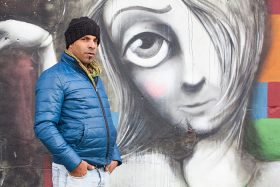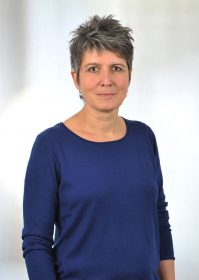Three Question for Anthropologists Dr. Dani Kranz and Katja Harbi

Photo: Katja Harbi
Our Academy programs regularly introduce new scholarship examining contemporary issues of migration and diversity. On May 4, University of Wuppertal anthropologists Dr. Dani Kranz and Katja Harbi will be presenting the results of the study they conducted, entitled Israeli Migration to Germany since 1990, with a lecture and show of photographs at the Jewish Museum Berlin. The research was largely about these immigrants’ identities and the significance of the Shoah for their lives in Germany, as well as the political and ideological debates occurring around them in Israel and Germany. We put three questions to the two anthropologists in advance of their presentation: → continue reading

Shlomit Tulgan made this Seder plate from clay for our children’s exhibition on Passover; Jewish Museum Berlin, photo: Jens Ziehe.
It’s Seder and the family is getting together. Some are traveling from farther away, others are flourishing right here. At the table are escarole, lettuce, parsley, kohlrabi, Belgian endive, and dandelion. But what about horseradish and red radish? They’re both late this year.
The story of the plants and their fruits that have particular meaning on the Seder plate at Passover could be told in various similar ways. They all grow in the Diaspora Garden, which you can visit inside the W. Michael Blumenthal Academy at the Jewish Museum. → continue reading
An Interview with Ines Pohl
The European Union currently faces a tensile test: Great Britain’s vote to exit, the rise of rightwing populist movements, the lack of a solution to the flow of refugees, fear of terror attacks, and economic decline. Reference is often made, in the political debate about how to respond to these issues going forward, to history.
At our event, “Times of Crisis” on 7 September 2016, we would hence like to discuss the significance of the past for current European politics, particularly considering today’s problems, together with international guests from Great Britain, France, and Poland, as well as Germany. The panel will consist of Dan Diner, Dietmar Herz, Étienne François, Hans Kundnani, and Adam Michnik. The moderator will be Ines Pohl, of whom we asked four questions that extend our view to include the USA.
Nevin Ekinci: Ms. Pohl, you have been in Washington since the end of 2015 as the correspondent for Deutsche Welle. How do you perceive the debates about the current European “crisis,” from a distance? Would you even use the term “times of crisis?” → continue reading


